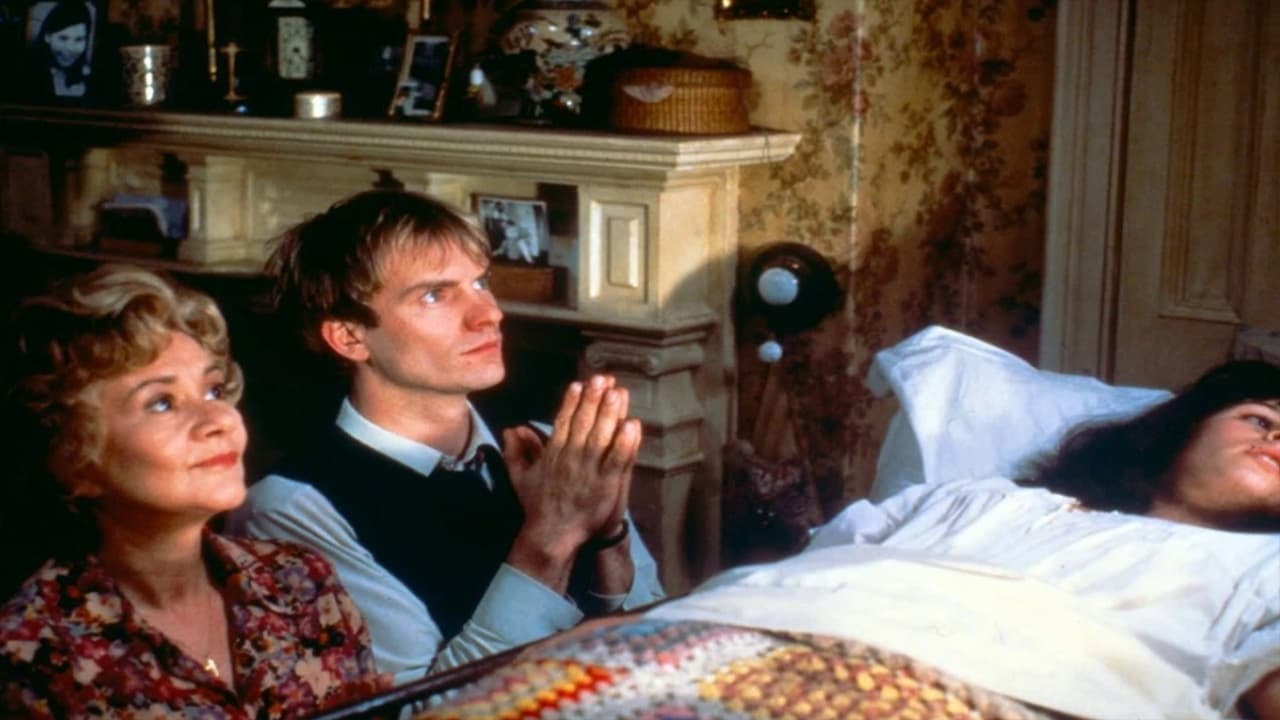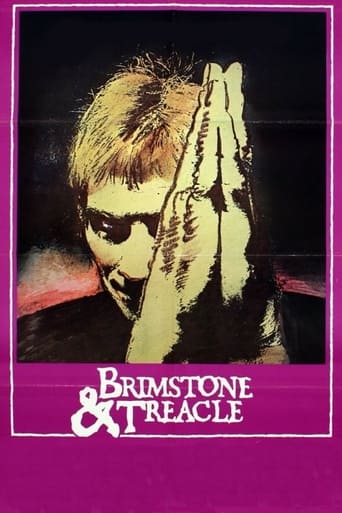Supelice
Dreadfully Boring
CrawlerChunky
In truth, there is barely enough story here to make a film.
Sharkflei
Your blood may run cold, but you now find yourself pinioned to the story.
Skyler
Great movie. Not sure what people expected but I found it highly entertaining.
fertilecelluloid
Brilliant allegorical drama from writer Dennis Potter and director Richard Loncraine. It is the fascinating tale of a young man, Martin Taylor (Sting), who -- to quote Denholm Elliott, "may be the Devil himself" -- manipulates his way into the home and trust of an ageing, embittered couple (Elliott and Joan Plowright) who "live in the shadows" after their daughter is injured in an accident and rendered mute. In a suggestion of Taylor's origins, the smarmy slimeball emerges from a church in one early scene and behaves like he's being physically assaulted when the bells begin to toll. Although his actual origins remain ambiguous up until the explosive, surprising climax, Loncraine and Potter have lots of fun keeping us guessing.The performances of all players are so good they're worthy of awards. It is thoroughly amusing to watch Sting ingratiate himself into Plowright's trust while Elliott fights with his natural distrust of strangers and occasionally blurts out his true feelings through a stiff upper lip. Suzanna Hamilton, as the disabled Patricia, communicates great inner torment and anger with limited resources of expression.Potter's script, adapted from his play, is simply riveting. His uncanny ability to capture real language, behavior and see-sawing emotions is a joy to behold and draws us into a highly emotional, sometimes surreal drama. A stormy prayer sequence is a standout, as is an economically directed flashback sequence that reveals the cause of everybody's unease. A wicked, very English sexual undercurrent throbs beneath the polite surface of the drama, as does a pitch black vein of humor.The music (Sting and Michael Nyman) sits perfectly in every scene, embellishing mood and tone, the cinematography of Peter Hannan is moody and striking, and Paul Green's sharp and inventive cutting is terrific.Outstanding in every department.
rufasff
This film was never around much at the time of it's release dispite some good word of mouth. It is pretty well brought off in every way, but leaves one feeling one has seen a rather more obvious version of Pinter with then trendy rock and an even more pronouced lack of point. Sting holds his own surprisingly well with his classy co-stars.. It's Potter's heavy handed irony, admittedly popular, that just tires you out.
Henrik Nameless
A brainchild of Dennis Potter, grand purveyor of the kind of surreal, darkly-comic TV landmarks that set out to shock the system, the public, and the finger wagging likes of Mary Whitehouse et al, comes the surreal, darkly-comic but not quite landmark 'Brimstone and Treacle'. Much like the Alan Clarke/Roy Minton borstal set drama 'Scum', 'Brimstone and Treacle' began its life as part of the BBC's revered and highly popular 'play-for-today' series. However, when auntie Beeb and the powers that be took a look at director Barry Davis' rough-cut, the vision of a Pinter-esque fallen-angel despicably conning his way into the home of a middle-aged couple and their handicapped daughter, who he eventually rapes, was just too much for the woolly-jumper, Wogan worshiping suits at the beeb -- who banned it outright before it's proposed airing back in nineteen-seventy-six.
The script, we presume, then lay at the bottom of Potter's desk drawer whilst he busied himself with something called 'Pennies from Heaven' (classic BBC musical drama with Bob Hoskins, later given an MGM make-over starring Steve Martin and Christopher Walken), eventually resurfacing in this cinematic incarnation, with direction from Richard Loncraine, and starring (of all people) former Police front-man Sting. The casting, which should be crucial to a piece like this, seriously fails here, with the sight of the (then) reggae-influenced pop-star swaggering about the screen like Billy Idol's freakish younger brother, emitting a feeling of true disappoint -- especially when compared to the detailed characterisations of Michael Gambon's Philip E. Marlow in 'The Singing Detective' or Albert Finney's Daniel Feeld from 'Karaoke'. And if his camp-theatrics aren't bad enough, surely the sight of his bare-buttocks wriggling atop a frontally nude Suzanna Hamilton is as embarrassing for the now 'serious artist' as it is for the disconcerted viewer.Thankfully the supporting cast are exceptional, both Joan Plowright and Denholm Elliot (who reprises his role from the original version) give the film a touch of old school charm, whilst Hamilton pulls off the embarrassing task of playing mentally retarded with a willing confidence. It's a shame the producer's decided to go with the "bankable" choice of Sting in the lead, because at its very core, 'Brimstone and Treacle' had the potential to be one of Potter's strongest work. It sadly falls somewhat short, and admittedly, it's not all Sting's fault. Although there are many familiar Potter trademarks, notably the use of thirties music -- used hear as bookends -- conjures up memorable images of Marlow crooning along to Vera Lynn in 'The Singing Detective', but the elements just don't gel. The golden oldies seem to grate, especially when coupled with contemporary artists like Squeeze, The Go-Go's and (of course) The Police -- something which would seem to signal a conflict of interests between the writer and director's distinctive sensibilities.Potter hints and psychological guilt, and sexual repression, but looses the TV play's strongest metaphysical link somewhere in the celluloid translation. In the original, Hamilton's character Patti comes home early to find her father in bed with her best-friend, forcing her to run into the street in disgust, where she is hit by a truck. For the film, Potter has opted for the more conventional playing away with the receptionist routine, turning the proceeding events into a conventional tale of guilt, rather than the implied oedipal fear of paternal molestation that is a constant foreboding in the original work.What we have instead is an almost-pastiche of Hammer horror movies and a somewhat condemnation of organised religion as a whole. There is the lack of faith in the guilt ridden Mr Bates that is countered by the caring of the maternal (but blinkered) Mrs Bates, who spends the film spouting reactionary quotes to her husband's claims of "There is no God" with the likes of "I'd sooner be dead than think like that"... is there a message here? Or did Potter simply have his knickers in a twist. Admittedly this is one of his more self-consciously shocking works, and nowhere near as enjoyable as later productions would prove to be, but thankfully there is at least a spark of imagination, something that is lacking in current British film. 'Brimstone and Treacle' may be Potter-lite, but it's certainly worth a look.
Carlos Xavier
33. BRIMSTONE AND TREACLE (thriller-drama, 1982) Martin (Sting) befriends middle-aged bookkeeper Tom (Denholm Elliott). Martin cons his way into his house by passing himself as friend to his daughter. Daughter Patricia has been left a mute and bedridden for 3 years after a mysterious car accident. Though Tom is suspicious of Martin's exact motives, his wife is beguiled by Martin's charm. But what they don't know is that Martin is sexually abusing their defenseless and disabled daughter.Critique: Part fairy tale, part religious parable, this creepy, atmospheric film is highlighted by a wickedly perverse turn by Sting (lead singer of rock group 'The Police'). What makes his character such a bizarre figure is that his motives are unknown, his appetites unresolved. I think Martin is just a thief, passing himself as anyone's friend just to have a place to stay. A sort of pickpocket. He's also a sexual deviant who doesn't mind how he gets it, either from an invalid or an old woman. The film portrays him as an avenging angel-type, brought into this deeply secular home as a purger of sins. Interesting direction by Richard Loncraine (is this his film debut?) who works from a play adapted by Dennis Potter, whose own sexually dubious works are to be questioned. 'The Police', along with 'The Go-Gos' provided the 'hip' soundtrack.

